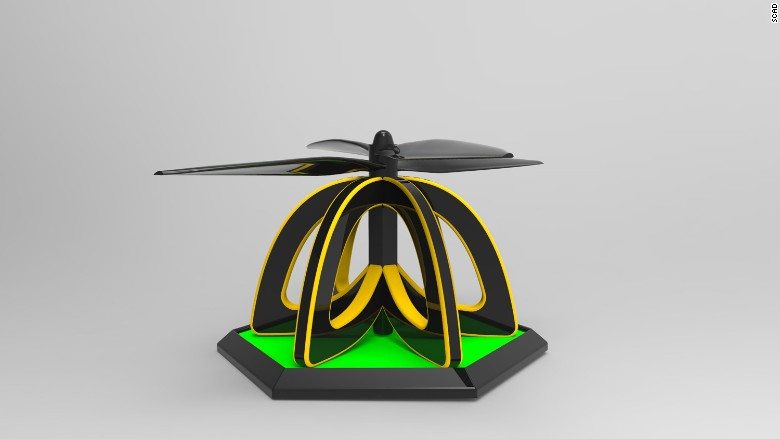
Most of us probably already know that the bee population is diminishing at an alarming rate. And all of us should be really worried about this matter as bees are not only useful in producing honey but are also responsible for pollination, which in turn helps flowers in reproduction. The usage of harmful pesticides, the changing climate, and habitat clearance has resulted in a decrease in the population of bees. And right now, the USA has listed bumblebee as an endangered species.
Apart from some small programs, nothing really has been achieved in protecting the bees. It won’t be really surprising if the bee population gets extinct sometime soon.
Scientists have been working on trying to find a replacement for pollinating plants for some time now. And it looks like they have finally found a breakthrough in the form of drones that can perform pollination. [Black Mirror much?]

Eijiro Miyako and his colleagues at the National Institute of Advanced Industrial Science and Technology, Japan, have used the principle of pollination in drones they bought for a $100. They then glued patches of horse hair on the quadcopter to add more surface area so that pollen grain can remain in place. The researchers then applied liquid gel to make the hair sticky and wet.
Their experiment was a success and the drone can now fly around pollinating lily flowers just like a bee would.
But can we get to see automated bee-like robots pollinating flowers like in the series Black Mirror? Well, the scientist? Well, yes. The scientists have mentioned that ‘robotic pollinators could be trained to learn pollination paths by using global positioning systems and artificial intelligence’.
Katja Hogendoorn, postdoctoral research associate, University of Adelaide, said, “It is an intriguing idea, of course, it’s not new as an idea, it’s a start — they’ve achieved it with a very big flower, mind you.”
Well, if this concept can really replace bee population, then it would be something great. But what about the cost price of running this program all over the world? Well whatever it is, I hope they will be successful in using these drones as bees’ replacements because the world will be in a dire need of pollinating agents once the bee population vanishes.







![Best Gaming Laptops in Nepal Under Rs. 250,000 (रु 2.5 Lakhs) [2025] Best Gaming Laptops Under 2.5 lakhs in Nepal [Feb 2025 Update]](https://cdn.gadgetbytenepal.com/wp-content/uploads/2025/02/Best-Gaming-Laptops-Under-2.5-lakhs-in-Nepal-Feb-2025-Update.jpg)
![Best Gaming Laptops in Nepal Under Rs. 120,000 (रु 1.2 Lakhs) [2025] Best Budget Gaming Laptops Under Rs 120000 in Nepal 2025 Update](https://cdn.gadgetbytenepal.com/wp-content/uploads/2025/05/Best-Budget-Gaming-Laptops-Under-Rs-120000-in-Nepal-2024-Update.jpg)
![Best Laptops Under Rs. 80,000 in Nepal [2025] Best Laptops Under 80,000 in Nepal March 2025 Update](https://cdn.gadgetbytenepal.com/wp-content/uploads/2025/03/Best-Laptops-Under-80000-in-Nepal-March-2025-Update.jpg)
![Best Gaming Laptops in Nepal Under Rs. 200,000 (रु 2 Lakhs) [2025] Best gaming lapotp under 2 lakhs Nepal Feb 2025](https://cdn.gadgetbytenepal.com/wp-content/uploads/2025/01/Best-Gaming-Laptops-Under-2-Lakh-Nepal-Feb-2025-Update.jpg)

![Best Mobile Phones Under Rs. 15,000 in Nepal [Updated 2025] Best Phones Under 15000 in Nepal 2024 Budget Smartphones Cheap Affordable](https://cdn.gadgetbytenepal.com/wp-content/uploads/2024/03/Best-Phones-Under-15000-in-Nepal-2024.jpg)
![Best Mobile Phones Under Rs. 20,000 in Nepal [Updated] Best Mobile Phones Under NPR 20000 in Nepal 2023 Updated Samsung Xiaomi Redmi POCO Realme Narzo Benco](https://cdn.gadgetbytenepal.com/wp-content/uploads/2024/01/Best-Phones-Under-20000-in-Nepal-2024.jpg)
![Best Mobile Phones Under Rs. 30,000 in Nepal [Updated 2025] Best Phones Under 30000 in Nepal](https://cdn.gadgetbytenepal.com/wp-content/uploads/2025/01/Best-Phones-Under-30000-in-Nepal.jpg)
![Best Mobile Phones Under Rs. 40,000 in Nepal [Updated 2025] Best Phones Under 40000 in Nepal 2024 Smartphones Mobile Midrange](https://cdn.gadgetbytenepal.com/wp-content/uploads/2024/02/Best-Phones-Under-40000-in-Nepal-2024.jpg)
![Best Mobile Phones Under Rs. 50,000 in Nepal [Updated 2025] Best Phones Under 50000 in Nepal](https://cdn.gadgetbytenepal.com/wp-content/uploads/2025/01/Best-Phones-Under-50000-in-Nepal.jpg)
![Best Flagship Smartphones To Buy In Nepal [Updated] Best flagship phone 2025](https://cdn.gadgetbytenepal.com/wp-content/uploads/2024/07/Best-Flagship-Phones-who-is-it-ft-1.jpg)